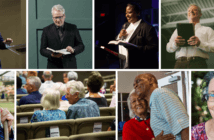All clergy face many challenges. But single persons in ministry can face a unique set of challenges around maintaining boundaries, privacy, and social connections, particularly if they serve in a congregation that has only been served in the past by married clergy. Some of the best advice for churches comes from a young single pastor — “congregations and pastors both should work on the tender balance between being supportive and allowing privacy.”
Church members can often subconsciously communicate the assumption that they expect their pastor to be married. For example, a single clergyman starting ministry in a new congregation was asked repeatedly “When will be meeting your wife?” or “Will your wife be teaching Sunday School or serving on the altar guild?” Similarly, congregants can project the assumption that marriage is normative for or sought by everyone when they drop hints about eligible friends the pastor might like to meet. While these kinds of comments are generally well intended, they can make a single person feel awkward, judged, or even inadequate. Congregations need to be sensitive to and accepting of different marital statuses among clergy.
It is easy for single clergy to fall into the trap of letting the church become their primary social outlet and support network. This is especially true if they have left behind friends and family to begin ministry in a new church and community. It is important to recognize that all clergy, but especially single clergy, need to build a set of relationships and friendships outside the church — people for whom they are not the “pastor.” This may mean that they seek opportunities for involvement beyond the church, such as book clubs, sports teams, or community groups, and find people who share common interests. Churches can encourage them to take time off to renew themselves and to connect with friends and family. Encourage them to connect with other clergy in the community that you feel will be supportive colleagues.
Single clergy often feel they are navigating a minefield when it comes to dating. In addition to fix-up attempts, they have concerns about a lack of privacy, the potential for rumors and ill-informed assumptions, and questions about when and how to let the congregation know about a serious relationship. These all can leave a single clergyperson vulnerable and confused. You can help by recognizing that it is normal and important for them to date. Trust the pastor to operate within their own level of comfort regarding how much they share with the congregation.
It is important that the congregation be aware of norms and expectations about whether it is appropriate for pastors to date congregants. Denominations or judicatories normally have clearly defined policies on this question, usually not permitting such dating. Both pastor and congregation must understand these policies and their rationale. Appropriate church leaders may need to educate the congregation about the policies. But always remember that great sensitivity is required so that this issue does not loom too large in people’s minds or distract from the larger issues in establishing the pastor’s ministry.
Single clergy who are parents may also feel they are vulnerable or open to special scrutiny. Pay attention to expectations for evening meetings and the need for childcare. Such care will also benefit other church members. The church does not have special responsibility for the pastor’s childcare but should do everything possible to make possible the active participation of those with young children.
Lewis Fellows, participants in a Lewis Center leadership development program for young clergy, contributed to this resource.




